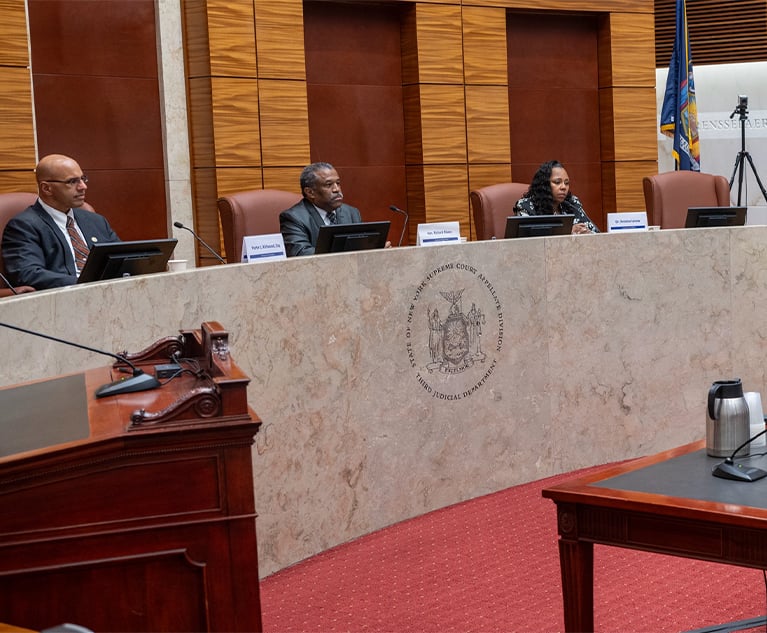Another Law Firm Expires Along With Its New York Lease
After an 80-year run, partners at Wormser, Kiely, Galef & Jacobs opted to dissolve the firm last month.
November 13, 2017 at 05:28 PM
11 minute read

Like many other small firms in Manhattan, the end of a lease triggered the dissolution of Wormser, Kiely, Galef & Jacobs, a general services firm dating back to the mid-1930s.
Wormser Kiely had as many as 38 attorneys a few years ago and an office in White Plains. But that office closed in 2014, and the firm saw defections when its merger talks with larger firms in the last few years did not come to fruition, said former Wormser Kiely managing partner Charles Banino.
Ultimately, 22 attorneys remained at the firm's East Midtown offices before the partnership disbanded in the last month to at least seven law firms: Greenspoon Marder; Condon & Forsyth; Kauff McGuire & Margolis; Warshaw Burstein; Eaton & Van Winkle; Phillips Nizer; and CKR Law.
“The lease was the primary driver” for the dissolution, Banino said. “People look at various relationships and opportunities, and when a lease expiration is staring at you in the face, you make the best decision for yourself, and more importantly, for your clients.”
Wormser Kiely is one of several small New York firms to fold in recent years when confronted with a lease expiration. Others triggered at least in part by lease terms include Kornstein Veisz Wexler & Pollard; Hofheimer Gartlir & Gross; and Morgenthau & Greenes.
New York law firm consultant J. Mark Santiago, speaking generally on the legal market, said surviving a lease expiration is a “large hurdle” for a small firm, especially in the last five years in Manhattan, where more and more landlords are demanding personal guarantees from partners in new leases.
Lease renewal and new leases “are one of the major reasons for small firm disintegration,” he said, “because it makes partners take a hard look at their firm's financial stability and long-term prospects.”
Banino, the former leader of Wormser Kiely, said its dissolution was “not for economic reasons,” noting that “last year's revenue was probably stronger than any other year in recent memory.” Banino declined to disclose firm revenue or partner profits.
With its lease expiring in early 2019 at 825 Third Ave., the firm could not renew, as the landlord, the Durst Organization, is seeking to redevelop the office tower, said Banino. “Every tenant has to leave,” he said.
Meanwhile, the partners had “different interests” and different opportunities with other firms, and some attorneys in their late 60s and early 70s didn't want to sign a long-term lease, he said.
Wormser Kiely was a product of the 1989 merger of two law firms that both dated to the mid-1930s, and it was composed of transactional, corporate governance, litigation and trusts and estate practices. It was also known for having a strong immigration practice.
The largest portion of the Wormser Kiely firm—10 attorneys in transactional, real estate, banking, trust and estate, litigation, and commercial law—landed at Condon & Forsyth, a 50-attorney firm in New York, Los Angeles and Miami.
The second-largest group, five attorneys who made up the bulk of Wormser Kiely's immigration practice, moved to labor and employment firm Kauff McGuire & Margolis, creating a new immigration practice there.
The group represents several international law firms for corporate immigration needs such as obtaining work visas and resident status for their employees. The lawyers also represent clients in other industries, such as entertainment and production, beverage, publishing, financial services and engineering industries, said Donald Wolfson, a former Wormser Kiely attorney who headed the group joining Kauff McGuire. Other attorneys coming from the firm include Andrew Lerner, Michael Mandel, Gayle Oshrin and Joseph Yoo.
“It was a harmonious, nonacrimonious dissolution,” Wolfson said. “We were together for a long, long time, and it was a very good vibrant partnership.”

Like many other small firms in Manhattan, the end of a lease triggered the dissolution of
Ultimately, 22 attorneys remained at the firm's East Midtown offices before the partnership disbanded in the last month to at least seven law firms:
“The lease was the primary driver” for the dissolution, Banino said. “People look at various relationships and opportunities, and when a lease expiration is staring at you in the face, you make the best decision for yourself, and more importantly, for your clients.”
Lease renewal and new leases “are one of the major reasons for small firm disintegration,” he said, “because it makes partners take a hard look at their firm's financial stability and long-term prospects.”
Banino, the former leader of
With its lease expiring in early 2019 at 825 Third Ave., the firm could not renew, as the landlord, the Durst Organization, is seeking to redevelop the office tower, said Banino. “Every tenant has to leave,” he said.
Meanwhile, the partners had “different interests” and different opportunities with other firms, and some attorneys in their late 60s and early 70s didn't want to sign a long-term lease, he said.
The largest portion of the
The second-largest group, five attorneys who made up the bulk of
The group represents several international law firms for corporate immigration needs such as obtaining work visas and resident status for their employees. The lawyers also represent clients in other industries, such as entertainment and production, beverage, publishing, financial services and engineering industries, said Donald Wolfson, a former
“It was a harmonious, nonacrimonious dissolution,” Wolfson said. “We were together for a long, long time, and it was a very good vibrant partnership.”
This content has been archived. It is available through our partners, LexisNexis® and Bloomberg Law.
To view this content, please continue to their sites.
Not a Lexis Subscriber?
Subscribe Now
Not a Bloomberg Law Subscriber?
Subscribe Now
NOT FOR REPRINT
© 2025 ALM Global, LLC, All Rights Reserved. Request academic re-use from www.copyright.com. All other uses, submit a request to [email protected]. For more information visit Asset & Logo Licensing.
You Might Like
View All

Law Firms Expand Scope of Immigration Expertise Amid Blitz of Trump Orders
6 minute read
'Reluctant to Trust'?: NY Courts Continue to Grapple With Complexities of Jury Diversity
Trending Stories
Who Got The Work
J. Brugh Lower of Gibbons has entered an appearance for industrial equipment supplier Devco Corporation in a pending trademark infringement lawsuit. The suit, accusing the defendant of selling knock-off Graco products, was filed Dec. 18 in New Jersey District Court by Rivkin Radler on behalf of Graco Inc. and Graco Minnesota. The case, assigned to U.S. District Judge Zahid N. Quraishi, is 3:24-cv-11294, Graco Inc. et al v. Devco Corporation.
Who Got The Work
Rebecca Maller-Stein and Kent A. Yalowitz of Arnold & Porter Kaye Scholer have entered their appearances for Hanaco Venture Capital and its executives, Lior Prosor and David Frankel, in a pending securities lawsuit. The action, filed on Dec. 24 in New York Southern District Court by Zell, Aron & Co. on behalf of Goldeneye Advisors, accuses the defendants of negligently and fraudulently managing the plaintiff's $1 million investment. The case, assigned to U.S. District Judge Vernon S. Broderick, is 1:24-cv-09918, Goldeneye Advisors, LLC v. Hanaco Venture Capital, Ltd. et al.
Who Got The Work
Attorneys from A&O Shearman has stepped in as defense counsel for Toronto-Dominion Bank and other defendants in a pending securities class action. The suit, filed Dec. 11 in New York Southern District Court by Bleichmar Fonti & Auld, accuses the defendants of concealing the bank's 'pervasive' deficiencies in regards to its compliance with the Bank Secrecy Act and the quality of its anti-money laundering controls. The case, assigned to U.S. District Judge Arun Subramanian, is 1:24-cv-09445, Gonzalez v. The Toronto-Dominion Bank et al.
Who Got The Work
Crown Castle International, a Pennsylvania company providing shared communications infrastructure, has turned to Luke D. Wolf of Gordon Rees Scully Mansukhani to fend off a pending breach-of-contract lawsuit. The court action, filed Nov. 25 in Michigan Eastern District Court by Hooper Hathaway PC on behalf of The Town Residences LLC, accuses Crown Castle of failing to transfer approximately $30,000 in utility payments from T-Mobile in breach of a roof-top lease and assignment agreement. The case, assigned to U.S. District Judge Susan K. Declercq, is 2:24-cv-13131, The Town Residences LLC v. T-Mobile US, Inc. et al.
Who Got The Work
Wilfred P. Coronato and Daniel M. Schwartz of McCarter & English have stepped in as defense counsel to Electrolux Home Products Inc. in a pending product liability lawsuit. The court action, filed Nov. 26 in New York Eastern District Court by Poulos Lopiccolo PC and Nagel Rice LLP on behalf of David Stern, alleges that the defendant's refrigerators’ drawers and shelving repeatedly break and fall apart within months after purchase. The case, assigned to U.S. District Judge Joan M. Azrack, is 2:24-cv-08204, Stern v. Electrolux Home Products, Inc.
Featured Firms
Law Offices of Gary Martin Hays & Associates, P.C.
(470) 294-1674
Law Offices of Mark E. Salomone
(857) 444-6468
Smith & Hassler
(713) 739-1250







